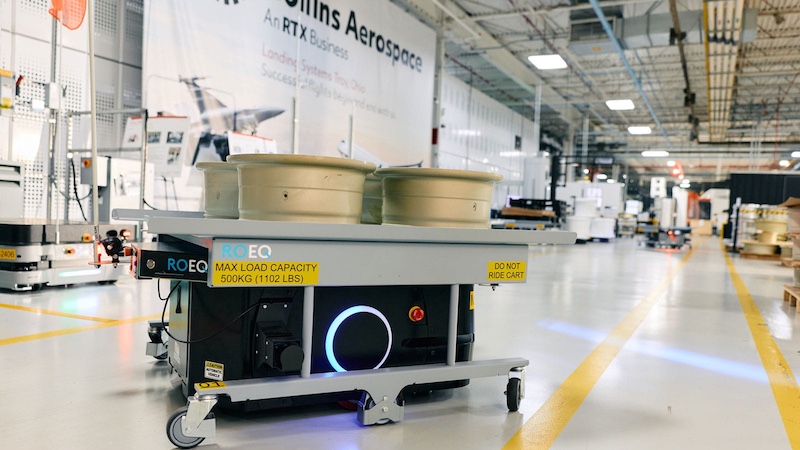Inside a compact production cell at Collins Aerospace’s wheel-and-brake facility in Troy, Ohio, two advanced machines now replace the five legacy machines once needed to produce aircraft wheels.
Together, they can cut production time from 45 days to just seven – a push the team calls “Wheels in a Week.”
Greg Smith, director of operations, says: “One, it’s obviously catchy. It rolls off the tongue, and the second, it is a challenge. And, everyone likes a challenge.
“Cutting time by 10 percent, (that’s) something we’re going to go do. Cutting it by 80 percent? That is a monumental effort that’s going to require all of us together to make it successful.”
Troy Brunk, Collins Aerospace president, praised the initiative: “Every second, an aircraft is either taking off or landing with our wheel and brake assemblies.
“Taking 45 days of lead time down to seven creates more flexibility for us and our customers. When we think big, we can do a lot of things.”
The Troy site, once a WWII glider plant, began its transformation five years ago with a deep clean.
“I’ll never forget that first cleanup – just me and a couple others out here on a weekend, suited up in coveralls, scrubbing off years of grime and grease,” says Scott Parkin, then plant manager and now vice president of Operations for Advanced Structures.
The effort built pride and cleared the way for lean processes and smart factory technology.
Parkin says: “We can machine exactly what’s needed, when it’s needed – and that makes us more nimble than ever. It’s beautiful.
“Not everything gets done in a week – it’s a journey. But we’ve done it, and we’re doing it more and more. It’s not just some big idea – it’s actually becoming how we work.”
The old process relied on multiple lathes and mills, time-consuming setups, and heavy manual handling.
“You’re crawling around inside the machines, carrying heavy fixtures, wrenching things down and into place, and lifting wheels in and out. Ergonomically, it was very difficult and a high-intensity job,” Parkin says.
Obsolete machines made repairs nearly impossible, explains Parkin.
The solution was a new generation of machining cells: multitask machines connected to pallet-changing systems that can handle every wheel configuration.
“We’re no longer locked into machining wheels in large batches or dedicating cells to specific programs,” says Justin Ruley, associate director of manufacturing and operations.
“The new cells give us the agility to switch between wheel configurations quickly, meet customer needs more effectively and ultimately speed up production.”
Automation now extends beyond machining. Autonomous material robots (AMRs – also known as autonomous mobile robots) move parts through the factory, reducing handling and improving safety.
“The biggest benefit for us has been reducing the number of times we have to handle each wheel,” Ruley says. “Safety is a priority in everything we do, and we’ve built a strong, ingrained culture of safety here at the Troy facility.”
With 13 advanced machining cells in operation and more planned, the Troy site is also creating space to expand into brakes as well as wheels.
“We’re ready for whatever comes our way, whether it’s more volume or new products we’re asked to manufacture,” says Ruley.
And the team sees this as just the beginning. “We’ve proven we can build wheels in just seven days – down from 45 – and we’re not stopping there,” Ruley says. “It’s a nonstop pursuit of perfection … always learning, always improving, always moving forward.”

